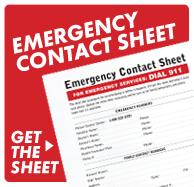Getting Help: Know the Numbers
Article Translations: (Spanish)
The best time to prepare for an emergency is before one happens. Make sure your family knows emergency phone numbers and your kids know how to place a call for help.
Need-to-Know Numbers
During an emergency, it's easy to become disoriented and upset, so you need to have all important phone numbers readily available ahead of time.
Write each phone number clearly in large print so it will be easy for kids to read. Use a pen with dark-colored ink or type it on the computer because pencil or light-colored ink can be harder to read when you're in a hurry or if lights are dim.
Because accidents can happen in any part of the home, make copies of the completed list and post one near every telephone in the house and on the refrigerator. Be sure to carry one with you when you are out of the house, and keep one in the car as well.
Also, consider programming emergency numbers into your cellphone. And make sure that people who come to the house to watch your kids (babysitters or relatives, for example) familiarize themselves with the list. If a babysitter is taking the kids out, make sure he or she also carries the list of numbers.
Make sure the list includes these numbers:
- emergency medical services: In most places this is 911, but your community may have its own number.
- poison control center: 1-800-222-1222. This toll-free number will put you in touch with the poison control center in your area.

- hospital emergency room
- fire department
- police department
- your child's doctor
- parents' work
- parents' cellphones and/or pagers
- neighbors and/or relatives
- pharmacy
Your list also should include known allergies (especially to any medicines), medical conditions, medications taken by family members, and insurance information for all members of the family.
If you are calling 911 from your cellphone, the dispatcher may not have enough information to pinpoint your location so be prepared to give details about where you are (for example, address, city, cross streets, major highway, and nearest exits).
If you have a home alarm, make sure you and others in the home know how to use it to activate local emergency services (ambulance, police, fire station).
If you're planning a trip to another country, make sure you know how to get help if the need arises. It's better to be prepared and keep a list of international numbers. Lists of international emergency numbers are available online and from embassies of each country.
Teaching Kids How to Call for Help
Even very young children can be taught how to place an emergency call for help. The most important advice is for them to stay calm and speak slowly and clearly.
To place a call to 911 and talk to the operator, kids should know:
- how to dial 911
- their full name
- their full address
- how to give a short description of the emergency
It is also helpful for your kids to know their phone number. The dispatcher will often ask this question in case the call is disconnected. Have your kids practice by speaking into a telephone (make sure the telephone is off).
Suggest a situation to your child, such as: "Mommy's fallen down the stairs and can't get to the phone. Now what do you do?" After your child enters the number, prompt him or her with questions that an emergency operator would ask, such as "What is your name?," "Where are you calling from?," and "What is the emergency?" Stress that the description should be short ("Mommy fell down the stairs") and that he or she should try to stay calm. Practice until your child feels comfortable.
No one wants to think about an emergency happening at home, but it's better to face that possibility than to be caught unprepared. So keep emergency numbers close by — it's a small step that could have a big payoff.
Note: All information is for educational purposes only. For specific medical advice, diagnoses, and treatment, consult your doctor.
© 1995-2024 KidsHealth ® All rights reserved. Images provided by iStock, Getty Images, Corbis, Veer, Science Photo Library, Science Source Images, Shutterstock, and Clipart.com

